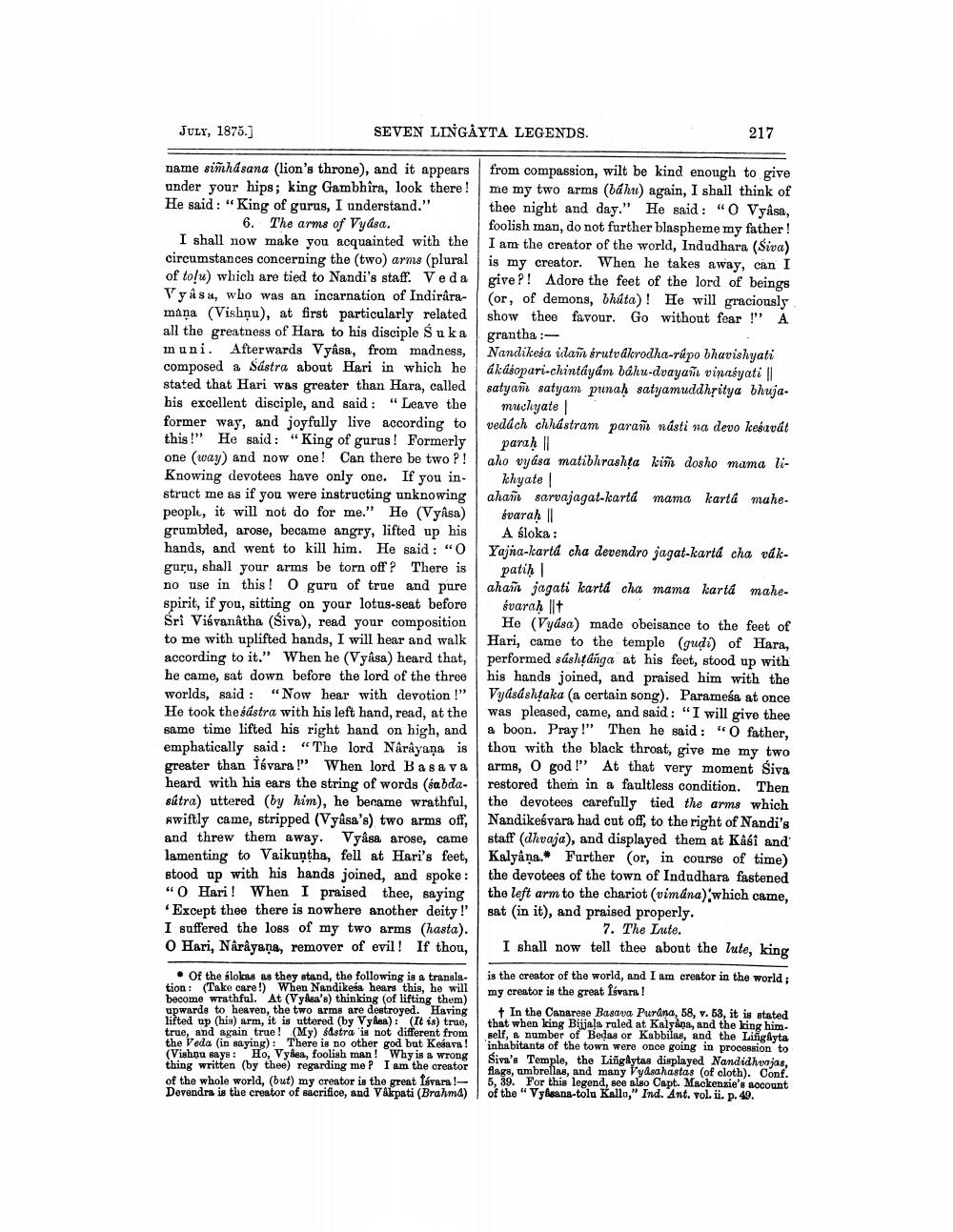________________
SEVEN LINGAYTA LEGENDS.
JULY, 1875.]
name simhasana (lion's throne), and it appears under your hips; king Gambhira, look there! He said: "King of gurus, I understand." 6. The arms of Vyasa.
I shall now make you acquainted with the circumstances concerning the (two) arms (plural of tolu) which are tied to Nandi's staff. Veda Vyasa, who was an incarnation of Indirâramana (Vishnu), at first particularly related all the greatness of Hara to his disciple S u ka muni. Afterwards Vyâsa, from madness, composed a Sastra about Hari in which he stated that Hari was greater than Hara, called his excellent disciple, and said: "Leave the former way, and joyfully live according to this!" He said: "King of gurus! Formerly one (way) and now one! Can there be two?! Knowing devotees have only one. If you instruct me as if you were instructing unknowing people, it will not do for me." He (Vyasa) grumbled, arose, became angry, lifted up his hands, and went to kill him. He said: "O guru, shall your arms be torn off? There is no use in this! O guru of true and pure spirit, if you, sitting on your lotus-seat before Sri Viśvanâtha (Siva), read your composition to me with uplifted hands, I will hear and walk according to it." When he (Vyasa) heard that, he came, sat down before the lord of the three worlds, said: "Now hear with devotion!" He took theśástra with his left hand, read, at the same time lifted his right hand on high, and emphatically said: "The lord Narayana is greater than Isvara!" When lord Basava heard with his ears the string of words (sabdasutra) uttered (by him), he became wrathful, swiftly came, stripped (Vyâsa's) two arms off, and threw them away. Vyâsa arose, came lamenting to Vaikuntha, fell at Hari's feet, stood up with his hands joined, and spoke: "O Hari! When I praised thee, saying 'Except thee there is nowhere another deity!' I suffered the loss of my two arms (hasta). O Hari, Narayana, remover of evil! If thou,
Of the slokas as they stand, the following is a translation: (Take care!) When Nandikesa hears this, he will become wrathful. At (Vyasa's) thinking (of lifting them) upwards to heaven, the two arms are destroyed. Having lifted up (his) arm, it is uttered (by Vyasa): (It is) true, true, and again true! (My) sastra is not different from the Veda (in saying): There is no other god but Kesava! (Vishnu says: Ho, Vyasa, foolish man! Why is a wrong thing written (by thee) regarding me? I am the creator of the whole world, (but) my creator is the great févara!Devendra is the creator of sacrifice, and Vakpati (Brahms)
217
from compassion, wilt be kind enough to give me my two arms (báhu) again, I shall think of thee night and day." He said: "O Vyasa, foolish man, do not further blaspheme my father! I am the creator of the world, Indudhara (Siva) is my creator. When he takes away, can I give?! Adore the feet of the lord of beings (or, of demons, bhúta)! He will graciously. show thee favour. Go without fear !" A grantha :
Nandikesa idam śrutvakrodha-rupo bhavishyati akasopari-chintayam bahu-dvayam vinasyati || satyam satyam punaḥ satyamuddhṛitya bhujamuchyate |
vedách chhastram parañ násti na devo keśavát par ||
aho vyása matibhrashta kim dosho mama likhyate |
aham sarvajagat-karta mama karta mahesvaraḥ || A sloka:
Yajna-kartá cha devendro jagat-kartá cha vákpatiḥ |
aham jagati karta cha mama karta mahesvaraḥ t
He (Vyása) made obeisance to the feet of Hari, came to the temple (gudi) of Hara, performed sashtanga at his feet, stood up with his hands joined, and praised him with the Vyásáshṭaka (a certain song). Paramesa at once was pleased, came, and said: "I will give thee a boon. Pray!" Then he said: "O father, thou with the black throat, give me my two arms, O god!" At that very moment Śiva restored them in a faultless condition. Then the devotees carefully tied the arms which Nandikeśvara had cut off, to the right of Nandi's staff (dhvaja), and displayed them at Kâsi and Kalyâna. Further (or, in course of time) the devotees of the town of Indudhara fastened the left arm to the chariot (vimana),which came, sat (in it), and praised properly.
7. The Lute.
I shall now tell thee about the lute, king
is the creator of the world, and I am creator in the world; my creator is the great Isvara!
In the Canarese Basava Purana, 58, v. 53, it is stated that when king Bijjala ruled at Kalyana, and the king himself, a number of Bedas or Kabbilas, and the Lingayta inhabitants of the town were once going in procession to Siva's Temple, the Liñgdytas displayed Nandidhwajas, flags, umbrellas, and many Vyasahastas (of cloth). Conf. 5, 39. For this legend, see also Capt. Mackenzie's account of the "Vyasana-tolu Kallu," Ind. Ant. vol. ii. p. 49.




